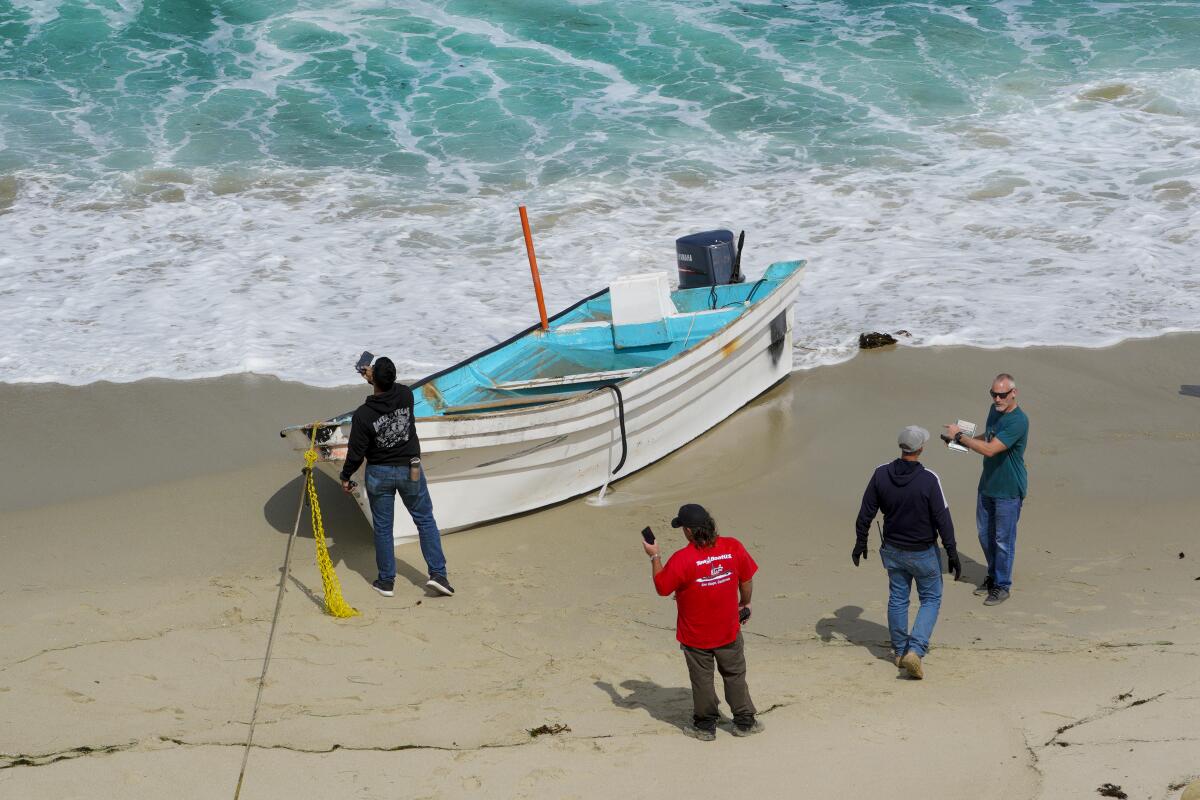Two sentenced to prison for human smuggling in boat death off San Diego

- Share via
SAN DIEGO — The illicit ocean journey from Mexico into the U.S. was beset by problems from the very beginning.
The simple fishing boat was overloaded with migrants trying to cross into the U.S., and the engine was no good. But after several fits and starts — including a wait in an island cave for the motor to be repaired — the decision was made to keep pressing ahead.
That choice had deadly consequences, leading to the drowning of a migrant in the turbulent waters off La Jolla in the predawn hours of May 20.
On Monday in a San Diego federal courtroom, U.S. District Judge John A. Houston admonished the two men who led the expedition in exchange for their smuggling fees.
“Somebody died, somebody is not here today, because of the risk you were willing to take,” he told them before pronouncing their sentences for charges of attempted human smuggling.
Jose Ramon Geraldo Romero, a 24-year-old Mexican national from Baja California Sur who was looking for construction work in the U.S. and agreed to help lead the journey as a refueler, was sentenced to five years in prison — the same term that prosecutors and defense attorneys had jointly recommended as part of the plea negotiations.
The judge found a more severe punishment was justified for Victor Alfonso Soto Aguilar, a 36-year-old fisherman from San Felipe, Baja California, who was asked to use his experience on the water to pilot the white-and-aqua panga boat. He was sentenced to an additional 11 months, or just under six years in prison.
“You’re the captain of the vessel,” Houston said. “You’re in charge.”
The case was highlighted again and again during the sentencing hearing as illustrating broader migration trends that cause people to take increasingly dangerous routes to flee desperate situations. The maritime route particularly has surged in popularity over recent years partly due to increased enforcement on land borders. It has also led to more deaths, like that of 43-year-old Rogelio Perez Gutierrez on this voyage, as well as three migrants who drowned in a similar crash off Point Loma weeks earlier.
The ill-fated journey began in Ensenada, and from the start Soto complained that the boat was over its capacity with 20 people aboard, including him and Geraldo, according to investigator interviews with passengers summarized in defense attorney records. Soto also grumbled about the motor.
The engine quit shortly after leaving Ensenada. Geraldo called someone referred to as “the boss,” who told them they couldn’t return to port but should reroute to an island. There, the passengers were dropped off and told to wait in a cave while Soto took the boat away for repairs.
He returned in the evening to pick them up and resume the voyage. But the engine failed again. Soto headed back to the island and offloaded four passengers in an effort to lighten the stress on the motor. Now with 14 passengers, they set off again.
While underway, Soto reportedly announced again that he wanted to abort the trip. But Geraldo allegedly said that they’d called the smuggling organizers twice already to quit, and a third time might get them all in trouble. So they continued on, heading for San Clemente.
Then they ran out of fuel.
Soto headed for land, ending up in the rough waters off La Jolla in the predawn hours.
Geraldo and Soto instructed the passengers to take off their life vests and jump into the sea, promising they were close to shore and in shallow water, according to the plea agreement. Neither Geraldo nor Soto asked the migrants whether they knew how to swim.
“It may have been high tide and also the breaking of the waves made him believe they were closer than they really were,” said Soto’s attorney, Roseline Dergregorian Feral.
All but two migrants did as they were told, and they struggled in the water. One passenger managed to climb back aboard. Soon after, two remaining passengers in the boat noticed a body floating in the water. Soto reversed the boat to rescue Perez, who was then pulled into the boat.
Geraldo attempted to resuscitate Perez but couldn’t save him.
“A wave literally took him away from me, and he died,” Geraldo told the judge.
Perez’s body ended up in the waves again, although it wasn’t clear how. Feral said the boat was likely jolted by the pounding surf near Children’s Pool once Soto and Geraldo had exited the vessel.
The Border Patrol had already spotted the maritime accident and was responding. San Diego lifeguards rescued at least eight people from the water near Marine Street Beach.
Both Soto and Geraldo issued apologies to the judge and Perez’s family, expressing deep remorse for their role in the death.
Soto also wrote a letter of regret to Perez’s family: “I would like you to know that we did everything possible to save Rogelio, but unfortunately by the time we took him out of the water it was too late. I will have his death on my conscience for the rest of my life.”
Soto and Geraldo are expected to appear in court again next month for a restitution hearing to decide how much they should owe Perez’s family for costs such as burial and repatriation of his remains to Mexico.
More to Read
Sign up for Essential California
The most important California stories and recommendations in your inbox every morning.
You may occasionally receive promotional content from the Los Angeles Times.











